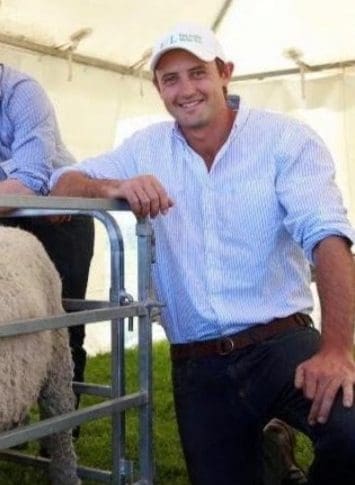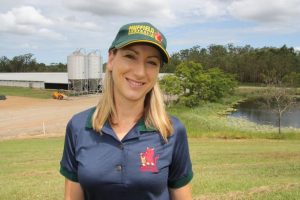
2020 Nuffield scholar and NSW Merino breeder Tom Hooke.
DROUGHT has prompted New South Wales Merino stud breeder Tom Hooke to look for ways to build more resilience into pastoral sheep production systems.
Tom, 32, was among 22 young Australian farmers awarded 2020 Nuffield Farming Scholarships at the annual awards dinner in Brisbane last night.
The young sheep man from Wanganella is supported by Australian Wool Innovation to research innovative regenerative agriculture principles that will apply to Australian pastoral sheep enterprises.
The Hooke family runs about 10,000 Merino breeding ewes, incorporating 1000 East Loddon Merino Stud ewes, and 200 Angus breeders, on 25,000 hectares of open pastoral country.
The ongoing drought has impacted his family operation’s stock numbers and returns.
“We’ve maintained stock numbers, but at a huge cost, by buying in grain.
“What I would really love to do is just grow more grass per millimetre of rain and have a healthy soil that can be more resilient.
“It won’t be a silver bullet, but every bit helps.”
Tom has been through two droughts – the Millennium drought (1996-2009) and the current one which started early last year, although the current season has been “fair.”
“They are all different, but the impact of last year was the most severe and quick — in 2008 we had sheep on agistment in Brewarrina, we had down in the Western Districts of Victoria – but this time around there was nowhere to go.”
His first thoughts were to follow the work of Zimbabwean holistic management pioneer Allan Savory and other like him.
“I would like to go to South Africa and Zimbabwe and then into the United States.
“I would also be interested in heading to South America to see what is happening there.”
Tom is still researching his study options, but said has also been influenced by Merino industry and regenerative farming advocate Charles Massy, the author of ‘Call of the Reed Warbler: A New Agriculture, a New Earth’.
“I just think the whole regenerative agriculture movement is getting a lot of traction – it’s an exciting space and I just want to make sure that the pastoral sheep zone is a part of it.
“I am interested in sustainability and long-term outcomes, but it still has to drive an increased profit – we are in it for the dollar.”
Tom said he wanted to help pastoral producers build the ability to handle climate variability into their businesses.
“Climate variability is part of what we deal with and we need processes to handle it.”
The 2020 Nuffield scholars will each receive a $30,000 bursary to research new agricultural technologies and techniques, and visit leading farm enterprises around the world on a 16-week travel program.
Nuffield said the 2020 scholars will seek to address some of agriculture’s crucial priorities, like ensuring the sustainable use of natural resources, attracting and retaining the best talent in farm businesses, identifying new markets and product premiums, and adopting technology to boost on-farm performance.
2020 Nuffield scholars share a vision for agriculture

Nuffield Australia Interim CEO, Jodie Redcliffe.
Nuffield Australia interim chief executive officer, Jodie Redcliffe, said the 2020 scholars and their study topics reflect the modern mindset of Australian farming, and are a cohort with a shared vision to collaborate and cultivate new agricultural practices for the betterment of the sector.
“For almost 70 years, Nuffield Australia has been supporting the best and brightest in Australian agriculture, and we are again excited to announce our newest Scholars for 2020, a group focused on building a stronger, more sustainable sector.
“With the generous support of their investors, scholars will gain access to world-class producers, agribusinesses and research institutions to conduct valuable research, and share these findings and insights with Australian producers once they return home,” Ms Redcliffe said.
Ms Redcliffe thanked investors for their ongoing contribution to fostering the next generation of talent in Australian agriculture, and congratulated 2020 scholarship recipients on their forward-looking choice of study topics.
“There is a real focus on the community amongst our 2020 group, with topics ranging from the adoption of regenerative principles to improve land management practices, to the prioritisation of nutrition in guiding cropping decisions, and researching the sector’s socio-economic impact in overseas markets, among many others” she said.
“These scholars will sow the seeds of change and their findings will act as a springboard for industry growth.
“In particular, their focus reflects the changing relationship between producers and consumers, and looks at how the sector is continually evolving to meet societal expectations across all aspects of food and fibre production,” Ms Redcliffe said.
The 2020 Nuffield scholars come from across the nation
Queensland
Alexandra (Tess) Camm from St Lawrence, supported by The Yulgilbar Foundation, will investigate ways to increase the value of beef co-products, particularly their potential use in biodegradable packaging, opportunities in emerging markets for nutritional and pharmaceutical products, and alternatives to the rendering process.
Brooke Barkla from Toowoomba, supported by ANZ Bank and Nuffield Australia Alumni, which in 2020 is entitled the ‘Ian Macintosh’ Scholarship, will research the socio-economic impacts of the Australian live export industry in existing and emerging markets.
Nicholas Krebs from Moura, supported by Meat & Livestock Australia, will investigate new ways to attract and retain more people into beef enterprises and help position the industry as a long-term career choice.
South Australia
Sarah Keough from Strathalbyn, supported by Wine Australia, will investigate new and emerging irrigation methods to reduce vineyard crop losses and sustain fruit quality during extreme heat events.
New South Wales
Bernie Byrnes from Gunning, supported by Westpac Agribusiness, will investigate the current opportunities and risks associated with purchasing farmland, seeking to identify trends relating to agricultural land values and lease rates.
Billy Browning from Narromine, supported by the Australian Department of Agriculture and the Murray-Darling Basin Authority, will investigate the value adding of irrigation water and increased utilisation of low-flow water.
James Alexander from Boorowa, supported by the NSW Department of Primary Industries, will research how mixed farming businesses can solve common land management issues, such as reduced ground cover and soil health.
Jarrod Amery from Forbes, supported by the Grains Research & Development Corporation, will research what it takes to build and maintain a successful farm business and achieve a sustainable Return on Assets Managed (ROAM).
Luke Cantrill from Nashdale, supported by Woolworths, will research drivers of success in overseas horticulture and viticulture businesses, international production systems, export opportunities and the cold chain.
Richard Quigley from Trangie, supported by the Cotton Research & Development Corporation and Cotton Australia, will investigate cropping systems and methods to retain more crop residue in zero-tillage farming systems.
Northern Territory
Tammy Kruckow from Katherine, supported by the Australian Agricultural Company, Consolidated Pastoral Company, Elders and S. Kidman & Co, will research how the northern pastoral industry can successfully retain and develop its workforce.
Western Australia
Albertus Hanekom from Kununurra, supported by the Fisheries Research & Development Corporation, will research pathways for the aquaculture and Barramundi industries to grow more seafood and better manage stock levels.
Andrew Todd from Dowerin, supported by the Grains Research & Development Corporation, will research ways that growing family farms can take the leap from an owner-operator structure to an owner-manager structure.
Paula-Lee Pownall from West Coolup, supported by the WA branch of Nuffield Australia, will investigate how to scale an insect production facility using the latest technology and research. She will also study the policies, procedures and supply chains of the emerging insect protein industry.
Victoria
Andrew Ham from Windermere, supported by the William Buckland Foundation, will research ways to increase agricultural efficiencies through alternative renewable energy sources and better utilisation of agricultural waste products.
Catherine Velisha from Werribee, supported by Hort Innovation, will undertake research into how horticultural family businesses can build and harness the skills they need to be competitive in the marketplace.
Dustin Pascoe from Raywood, supported by the Grains Research & Development Corporation, will research the benefits of grazing crops to fill the winter feed gap in a changing climate.
Harry Kelly from Caramut, supported by Rabobank Australia, will research ways for the Australian agriculture industry to multiply profitable business models, retain the right people and embrace change to become a more attractive investment.
Jason Cotter from Tuerong, supported by the William Buckland Foundation, will research ways to restore flavour, nutrition and sustainability as key drivers in grain production systems.
Johnny Gardner from Cavendish, supported by the William Buckland Foundation, will research sheep management, price incentives, market access and environmental changes across the supply chain.
Mitchell Henderson from Berriwillock, supported by the Grains Research & Development Corporation, will use his scholarship to research alternative fertiliser and weed control measures for grain producers.

HAVE YOUR SAY